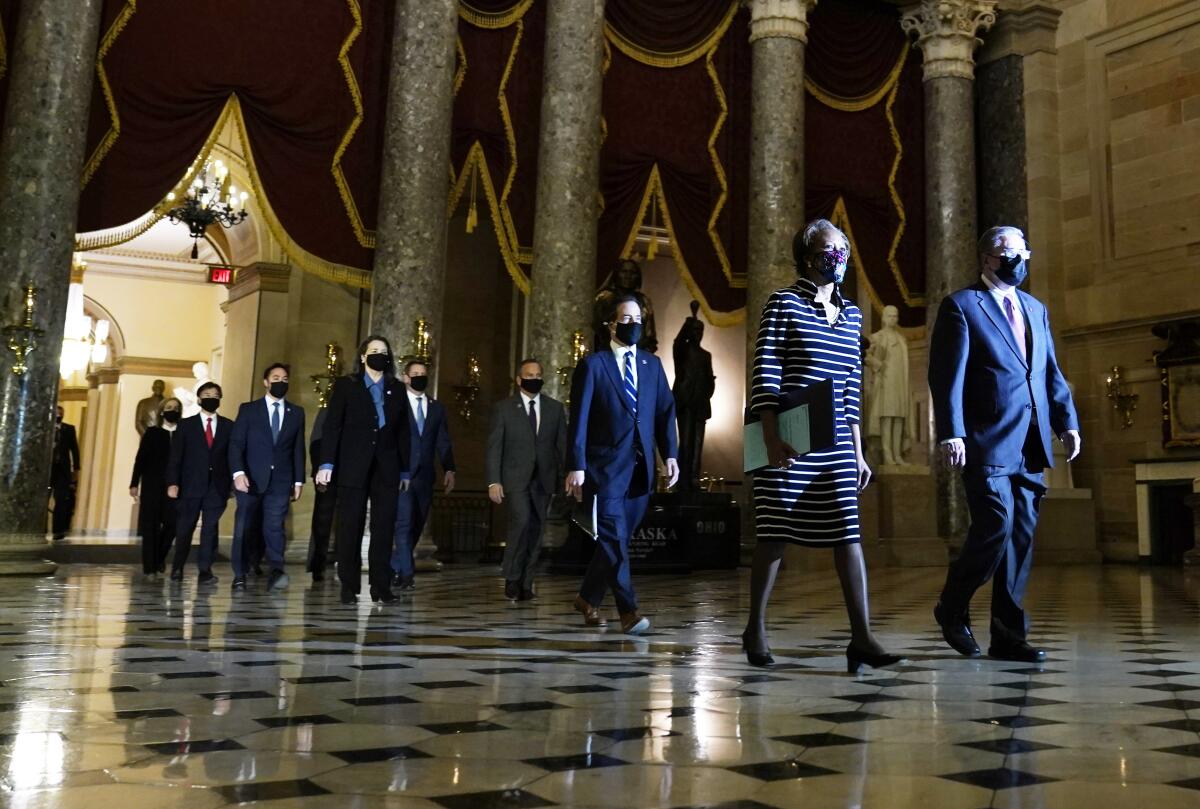With lessons from a year ago, Democrats prepare a different kind of impeachment trial

Expect Impeachment Trial 2.0 of former President Trump to be faster, easier to understand, more dramatic and possibly backed up by materials from inside the Trump White House itself.
Armed with lessons learned in Trump’s first impeachment trial, a more straightforward case and control of the Senate and White House, House Democrats in charge of prosecuting the upcoming Senate trial are preparing for what promises to be a dramatically different proceeding.
Missing are the months of public hearings, witness depositions of a convoluted cast of characters, and email and phone records intended to highlight Trump’s pressure on Ukrainian government officials to investigate his political rival, now President Biden. By the time it reached the Senate, the Ukraine impeachment report was nearly 800 pages long and many Americans tuned out of the nearly three-week trial.
This time, the House voted to impeach Trump in a week for inciting the Jan. 6 insurrection against the U.S. Capitol. Racing to act before Trump left office, there were no hearings or hand-wringing this time. Representatives began writing the article of impeachment while officers were still clearing rioters out of the building.
Like in 2020, Trump’s acquittal is all but certain since it takes the votes of 67 senators to convict and most Republicans voted earlier this week that the impeachment trial is unconstitutional because Trump has already left office.
But Democrats, still shaken by the mob attack that left five people dead, are vowing to push forward to hold Trump accountable in a trial expected to begin no sooner than Feb. 9. They say it will provide Americans the most complete account to date of what happened that day.
In contrast to digging through the bureaucracy of U.S.-Ukraine relations, next month’s trial — expected to last only a week or so — will be emotional and deeply personal. Representatives who cowered on the floor of the House chamber and galleries will be making their case to senators who were hustled from the chamber moments before the mob reached them, the same senators who pleaded with Trump by phone to intervene.
“The crime took place on their doorstep,” said Julian Epstein, who was chief counsel for the House Judiciary Committee during President Clinton’s impeachment. “It’s not abstract.”
He said the Democratic takeover of the Senate and White House opens the door to witnesses who can speak directly to what was happening in the administration, as well as internal White House materials that might show how much Trump knew about the threat of violence ahead of time, and what discussions were taking place in the hours it took to grant permission for federal officers to help secure the Capitol.
“There is going to be a pretty compelling case that is going to be presented, especially now that Democrats have access to executive branch material about what the White House knew about the violent intent,” Epstein said. He said based on his conversations with people on Capitol Hill, negotiations are ongoing about which witnesses and internal executive branch materials to present in the Senate, including perhaps testimony from people involved in right-wing groups accused of planning the attack.
“As I understand it, there is some rather damning information that will come out,” he said.
But University of Missouri law professor and impeachment expert Frank Bowman said that unless House managers uncover information that will shake GOP senators to the core, the chief point of the trial will be to educate the public .
“If it’s coherent and compellingly presented, it will penetrate some segment of the population,” Bowman said. “I would be thinking about this as if I was a documentary filmmaker and it was my job to take a convoluted set of events” and make sure the public “gets the picture.”
House managers are expected to rely heavily on Trump’s own words on social media and television in the weeks after the election, and at a rally the morning of the riot. They will focus on three key things: Did Trump know violence was possible Jan. 6? Did his words incite violence? And why did he prevent the military from quickly responding to requests for aid from the overrun Capitol Police?
“There is already substantial evidence that is public, much more so than the Ukraine impeachment. President Trump’s words inciting insurrection are there on audio and video for everyone to see, and you will surely have President Trump on video from the pre-insurrection gathering testifying against himself over and over again,” said Norman Eisen, a former counsel to House Democrats in Trump’s first impeachment.
Unlike during Trump’s first impeachment, Democrats now control the Senate and White House, and that may aid managers in painting a fuller picture of what Trump should have reasonably known was going to happen, Epstein said. The Trump administration refused to comply with the House’s first impeachment investigation, and wouldn’t provide documents or allow members of the administration to testify. Then, the Republican-controlled Senate refused to allow testimony from witnesses during the trial.
A spokesman for Speaker Nancy Pelosi (D-San Francisco) declined to discuss strategy. Spokespeople for several impeachment managers did not respond to emails and texts.
The defense strategy of Trump, now a private citizen in Florida, is also unclear. He has begun to hire private attorneys from North and South Carolina and his team’s first brief is due Tuesday.
Trump’s lawyers may argue Trump’s statements didn’t meet the criminal threshold for incitement. But first they are likely to insist the Senate trial is unconstitutional because Trump is no longer president. On Tuesday, 45 Republicans moved to dismiss the trial as unconstitutional before it began because Trump is a private citizen.
Epstein predicted managers will spend little time trying to prove Trump’s actions meet the threshold for criminal incitement. The 76-page report created by the House Judiciary Committee to lay out the basis for impeachment specifically does not cite any statutes. Both Eisen and Epstein said the managers will focus on whether inciting an insurrection is an impeachable offense, rather than if Trump could be prosecuted in a court of law.
“They are not going to get bogged down in that,” Epstein said. “Their theory is going to be very simple, that the former president was involved in an illegal effort to overturn the election, an election everyone agrees was legitimate … [culminating in a] violent attack on the Capitol. That is about as naked an abuse of power as you can imagine, and that is going to be their case.”
More to Read
Get the L.A. Times Politics newsletter
Deeply reported insights into legislation, politics and policy from Sacramento, Washington and beyond. In your inbox three times per week.
You may occasionally receive promotional content from the Los Angeles Times.







